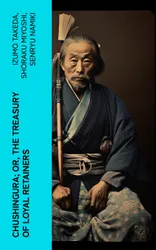"Chushingura; Or, The Treasury of Loyal Retainers" presents a rich tapestry of themes centered around loyalty, honor, and sacrifice. Originating from the world of Japanese kabuki and bunraku theater, this anthology brings together a stunning array of literary forms including drama and narrative poetry, celebrating the iconic story of the 47 ronin with emotional depth and cultural resonance. The compilation is noteworthy for its diverse storytelling methods, with each piece contributing uniquely to the profound exploration of duty and moral dilemmas. The stylistic variations among the works amplify the emotional gravity, inviting readers to engage with the timeless themes of personal and collective honor. The collective genius of authors Izumo Takeda, Shoraku Miyoshi, and Senryu Namiki illuminates the cultural and historical significance of the Chushingura narrative. These authors, renowned for their contributions to Edo-period literature, have deftly employed their mastery in weaving together traditional themes with innovative dramatic techniques. The anthology serves as a cultural vessel, transporting readers to the heart of samurai ethos and offering insights into the turbulent period of Japan's feudal history. Together, these voices create a unified chorus that enriches the thematic intensity and emotional resonance of the original narrative. This anthology beckons readers to immerse themselves in the intricate dynamics of feudal Japan through the lenses of these masterful storytellers. A multifaceted investigation of heroism and morality, the collection promises to educate and inspire, presenting a singular opportunity to explore the confluence of historical narrative and dramatic artistry. Engaging with this anthology not only deepens one's understanding of a pivotal cultural narrative but also fosters dialogue on the enduring human conditions reflected in these timeless stories.

Read and listen free for 30 days
Cancel anytime
Try free now